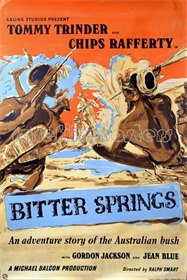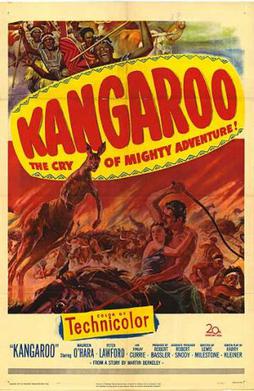
Jedda, released in the UK as Jedda the Uncivilised, is a 1955 Australian film written, produced and directed by Charles Chauvel. His last film, it is notable for being the first to star two Aboriginal actors, Robert Tudawali and Ngarla Kunoth in the leading roles. It was also the first Australian feature film to be shot in colour.

John Villiers Farrow, KGCHS was an Australian film director, producer, and screenwriter. Spending a considerable amount of his career in the United States, in 1942 he was nominated for the Academy Award for Best Director for Wake Island, and in 1957 he won the Academy Award for Best Adapted Screenplay for Around the World in Eighty Days. He had seven children by his wife, actress Maureen O'Sullivan, including actress Mia Farrow.

John Stange(r) Heiss Oscar Asche, better known as Oscar Asche, was an Australian actor, director, and writer, best known for having written, directed, and acted in the record-breaking musical Chu Chin Chow, both on stage and film, and for acting in, directing, or producing many Shakespeare plays and successful musicals.

Cinesound Productions Pty Ltd was an Australian feature film production company. Established in June 1931, Cinesound developed out of a group of companies centred on Greater Union Theatres that covered all facets of the film process, from production to distribution and exhibition. Cinesound Productions established a film studio as a subsidiary of Greater Union Theatres Pty Ltd based on the Hollywood model. The first production was On Our Selection (1932), which was an enormous financial success.

Smiley is a 1956 British-American comedy film directed by Anthony Kimmins and starring Colin Petersen. It was based on the 1945 novel of the same name by Moore Raymond who co-wrote the film with Kimmins. It tells the story of a young Australian boy who is determined to buy a bicycle for four pounds, and along the way he gets into many misadventures.

Herbert Sydney Wilcox CBE was a British film producer and director.
David MacDonald was a Scottish film director, writer and producer.

Bitter Springs is a 1950 Australian–British film directed by Ralph Smart. An Australian pioneer family leases a piece of land from the government in the Australian outback in 1900 and hires two inexperienced British men as drovers. Problems with local Aboriginal people arise over the possession of a waterhole. Much of the film was shot on location in the Flinders Ranges in South Australia
Sons of Matthew is a 1949 Australian film directed and produced and co-written by Charles Chauvel. The film was shot in 1947 on location in Queensland, Australia, and the studio sequences in Sydney. Sons of Matthew took 18 months to complete, but it was a great success with Australian audiences when it finally opened in December 1949.

Kangaroo is a 1952 American Western film directed by Lewis Milestone. It was the first Technicolor film filmed on location in Australia. Milestone called it "an underrated picture."

Chu-Chin-Chow is a 1923 British-German silent adventure film directed by Herbert Wilcox and starring Betty Blythe, Herbert Langley, and Randle Ayrton.

Chu Chin Chow is a 1934 British musical film directed by Walter Forde and starring George Robey, Fritz Kortner and Anna May Wong. It was an adaptation of the hit musical Chu Chin Chow by Oscar Asche and Frederick Norton. It was shot at the Islington Studios of Gainsborough Pictures in London. The film's sets were designed by the art director Ernö Metzner.

The Kangaroo Kid is a 1950 Australian-American Western film directed by Lesley Selander.
Tom McCreadie (1907–1992), better known as T. O. McCreadie was an Australian film director and producer, who was also involved in distribution and exhibition for many years.
Strong is the Seed is a 1949 Australian drama film, about the life of agronomist and plant breeder William Farrer.
The Glenrowan Affair is a 1951 movie about Ned Kelly from director Rupert Kathner. It was Kathner's final film and stars VFL star Bob Chitty as Kelly. It is considered one of the worst films ever made in Australia.
Alexander Roy Harwood (1897–1980), better known as A. R. Harwood, or Dick Harwood, was an Australian film director and producer who also worked in exhibition. He was inspired to become a filmmaker when he was posted to Tahiti to work for an insurance company and watched the shooting of Never the Twain Shall Meet (1925). He returned to Australia and produced and directed The Man Who Forgot (1927).
Seven Little Australians is a 1939 Australian film directed by Arthur Greville Collins and starring Charles McCallum. It is an adaptation of Ethel Turner's 1894 novel in a contemporary setting.
Hartney J. Arthur was an Australian actor, writer and film director, who worked in stage, radio and film.
Bismark Convoy Smashed!, also known as Battle of the Bismark Sea, is a Second World War 1943 Australian documentary newsreel film about the Battle of the Bismarck Sea on 2–3 March, an engagement which resulted in the claimed destruction of 22 Japanese ships, their crews and 15,000 soldiers. Actual Japanese losses were rather less, but still devastating.











